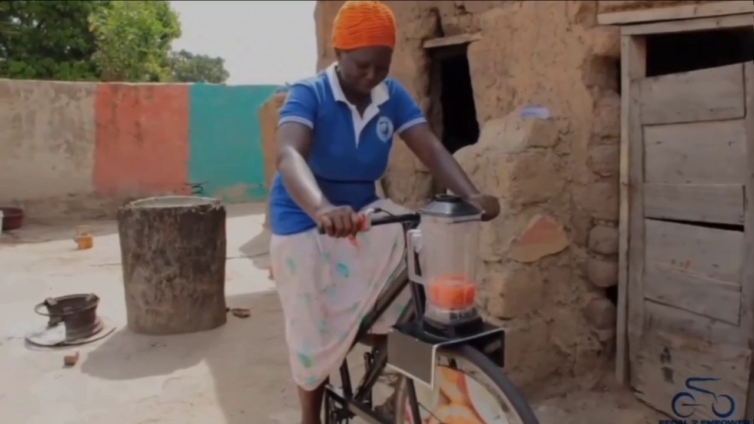Rural communities yet to be connected to the national grid are presented with a challenging environment that impacts adversely on the livelihoods of farmers.
To ease their burden, a lecturer at the Takoradi Technical University developed blenders and shellers built on bicycles to support communities without electricity.
About 75% of households in Ghana’s regions of the north are farmers, but their inaccessibility to electricity makes it nearly impossible to live conveniently.

Women and children in such areas are heavily impacted by the lack of electricity.
Under the Pedal 2 Empower project, researchers at the Takoradi Technical University have designed a simple environmentally-friendly machine to aid residents in the Upper West Region.
The blenders and shellers are built on a bicycle frame which employs paddling to power the blades of the blender for cutting and shelling.
Team lead for the eco-friendly project, Kwadwo Asare Apori, explains the machine works efficiently by converting the energy from paddling into electricity.

“The machine employs the dynamo mechanism to power the blenders and sheller to function. The greater the force applied, the more efficient the machine works. This is actually sustainability designing,” he said.
Most residents in Ghana’s North are known for their adept skill in cycling as it is the major means of transport in most rural communities in the five regions.
“The bicycle blenders and shellers will be easily adopted by these communities,” Kwadwo Asare cites as one of the reasons for developing the machines.

The group built maize sheller, rice dehusker, and shea nut grinder for the communities including Mangu, Goli, Kperisi, and Manwe.
The pedal-powered machine not only provides convenience but a means to reduce carbon emissions.
“Because there’s no fossil fuel usage, the machine helps reduce greenhouse gas emissions. It helps in personal health improvement. This is a practical eco-friendly project. It can be used for educational purposes,” Kwadwo Asare added.

For users of the machine, this would ease the burden of grinding on stones and farming activities while boosting their health.
“This machine is a better alternative to the electric blenders. If have this machine at home, I will be able to prepare meals and blend spices. I sometimes have to hide or go to a friend’s place to use a blender,” one of the beneficiaries shared her experience with the machine.
The developers seek to extend the project to other regions as demand for the machine surges.
“If we have enough funding, we will be able to provide these machines freely to these communities to facilitate their domestic chores,” Kwadwo Asare appealed for support.
Latest Stories
-
Edmund Adwetewa Tumtuo
6 minutes -
Why Ntim’s Resignation is Preferable to Indefinite Absence in a Struggling NPP
21 minutes -
Ghana ranked 10th in Africa with highest fuel prices
30 minutes -
Abuakwa South MP donates GH¢45,200 to support feeding at Kibi School for the Deaf
37 minutes -
‘Just the beginning’ – Finance Minister Ato Forson hails Fitch ratings boost for Ghana
59 minutes -
Coral Reef champions inclusive tech education at ALX Ghana event
1 hour -
Ghana’s inflation to average 15% in 2025 – Fitch
1 hour -
Telecel leadership pays courtesy calls to new leaders in Ashanti Region
1 hour -
Ghana’s public debt to fall to 60% in 2025, 2026 – Fitch
1 hour -
One feared dead, others injured in horrific STC van-tricycle crash in Ho
1 hour -
Reshaping Africa’s Digital PR Future – Authentic communication with local relevance
1 hour -
Supreme Court nominee says there is nothing wrong with number of justices on Supreme Court bench
1 hour -
Payment of nursing trainees’ allowances to be automatic – Mahama
1 hour -
University of Ghana suspends 14 students, sanctions 97 for exam misconduct
1 hour -
Personal beliefs must not interfere in rulings on same-sex cases – Supreme Court nominee
2 hours

